
Shelter from the Storm August 2023 | saltmagazine.org.nz Refuge in Rolleston MORE in Person A Shoe That Fits Inside the High Council
8 Refuge in Rolleston
The Rolleston Corps Plant leaders share their passion for creating a safe harbour for those battling the storms of life.
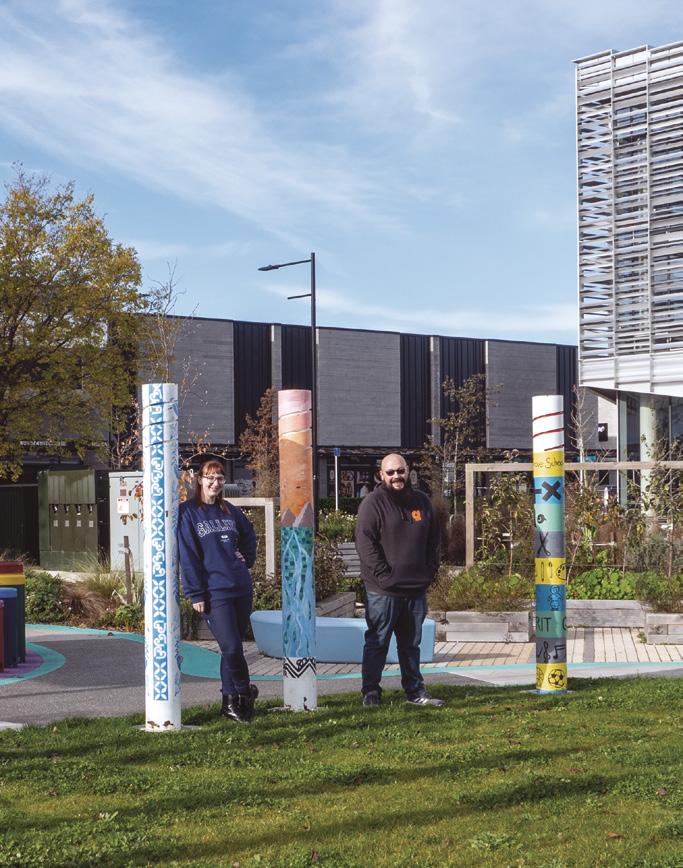
12 Turn Down the Noise!
MORE Conference was attended by 120 children and youth leaders from across the territory, who celebrated meeting in person for the first time since the pandemic.

18 Addicted to Jesus
Amelia Eagle from Levin Corps describes her journey from drug addiction to a new life of hope and faith in Jesus.
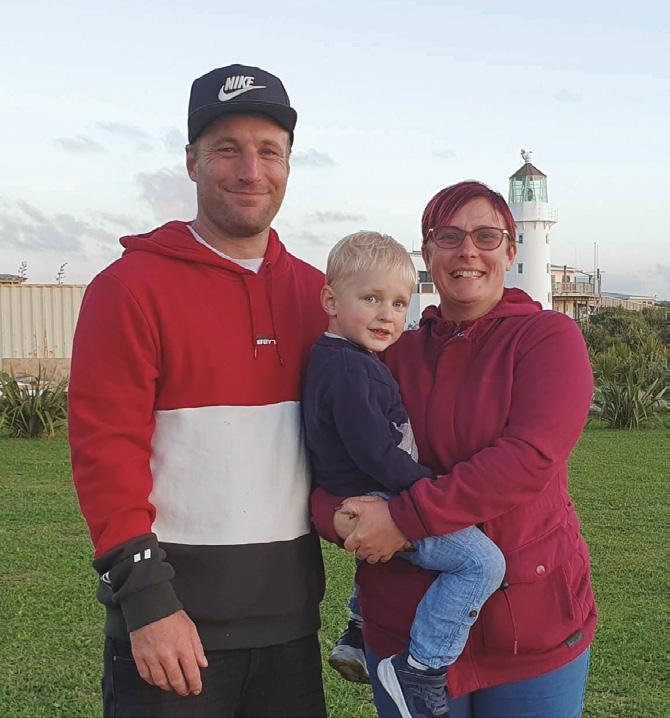
20 Te Kai Mākona Takes Off
The Army’s new food security framework is taking off around the country.

33 Gisborne Floods: 1948
Looking back at a previous flood in Gisborne in 1948 and the heroic efforts of Gisborne Corps as they rallied to support their community in crisis.
Cover Art: Lauren Millington
SALT Magazine
The Salvation Army New Zealand, Fiji, Tonga and Samoa Territory
Territorial Leaders
Commissioners Julie and Mark Campbell
General
Brian Peddle
Founders
Catherine and William Booth
Editor Vivienne Hill
Graphic design Sam Coates, Nicole Gesmundo, Lauren Millington
Staff writers
Jules Badger, Captain Rachel Montgomery, David Youngmeyer
Proof reading
Major Glenys Fairhurst, Colleen Marshall
Connect with us saltmagazine.org.nz
SalvationArmyNZFTS @SalvationArmyNZ salvationarmynzfts Territorial Headquarters, 204 Cuba Street, PO Box 6015, Marion Square, Wellington 6141 p: (04) 384 5649
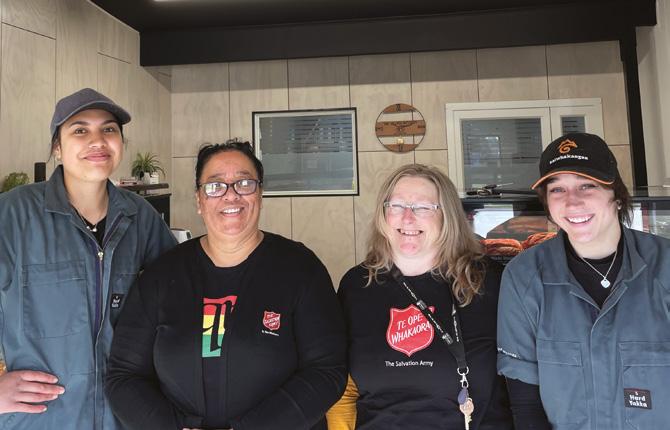

e: salt@salvationarmy.org.nz
All Bible references from the Holy Bible, New International Version, unless otherwise stated. Views and opinions expressed do not necessarily represent those of The Salvation Army.
Articles are copyrighted to The Salvation Army, except where indicated, and may be reprinted only with permission.

24 14
08 22
18 20
12
05
Publishing for 140 years Volume 3, Issue 4 ISSN 2816-1351 (Print) ISSN 2816-136X (Online)
Subscriptions mailorder@salvationarmy.org.nz Print Management MakeReady
Contents 2 August 2023
Safe Places from the Storm
here is no doubt that chaos and decay tend to be the natural or default state if things are left to themselves. Just stop doing the housework for a month and see what happens, or leave a two-year-old without parental intervention. Order needs to be worked at, whereas chaos continues to do its relentless work when left unchecked.
The process of bringing order was the first job given to humankind at our creation. ‘God took the Man and set him down in the Garden of Eden to work the ground and keep it in order’ (Genesis 2:15, MSG). God planted a garden, he created three rivers, he formed trees and shrubs, animals and mammals and silver and gold—all found in the garden. God didn’t plant a neatly trimmed box hedge. No, God’s order was much more organic. He created meandering rivers with inlets and eddies and lush vegetation ready for both animals and humankind to enjoy and consume. But maintaining that order was given to humans, who were told to subdue the earth.
The Church is also tasked with saving people from chaos, and to do this we need to ensure we have the welcome mat out and the light on
in the window. On page 8 in this edition, you can read about the Rolleston Corps Plant who have created a place of acceptance for anyone who may come to them to shelter from the storms of life. Captain Stu Duxfield says of the Church at large: ‘Sometimes we try to do the work of restoration without establishing this safe place’.
Rolleston Corps Plant has created a safe place so that the Holy Spirit can work on healing and transformation in people’s lives. But for this to happen regularly, we need to be intentional in ensuring sanctuary for those who have suffered: to allow them to come as they are; to allow them to stop and start and stop and start again; to commit to walking beside them and lovingly and tenderly helping them to create order out of the chaos, not like the box hedge-type of order but the organic spontaneous growth of a garden, just like Eden.
Vivienne Hill Editor
saltmagazine.org.nz 3
‘Each one will be like a shelter from the wind and a refuge from the storm, like streams of water in the desert and the shadow of a great rock in a thirsty land.’ ISAIAH 32:2
What’s On?
Self Denial Appeal
4–20 August
For more information, visit selfdenial.org.nz
Tonga Men’s Mission Trip and Camp

28 August–1 September
Ōamaru Corps 140th Anniversary
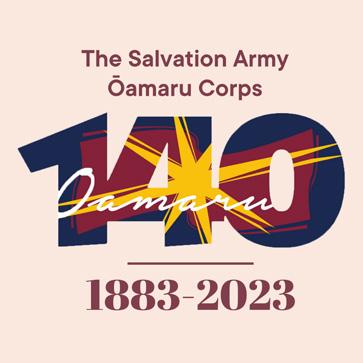
2–3 September
Honouring the past, celebrating the present and imagining the future. Register at: oamaru.corps@ salvationarmy.org.nz
Invercargill Corps 140th Celebration
9–10 September Including outdoor
events, memory lane, Saturday concert, Sunday worship and shared lunch. e: invercargill.corps@ salvationarmy.org.nz

QUICK QUIZ
1 Which country has the most pyramids in the world?

2 Tbilisi is the capital of which country?
3 What does the Māori word kaiako mean?
4 Which cricketer has scored the most runs in test matches?
5 Which is the fastest bird in the world? Answers page 32
INTRIGUING INDEX Fascinating Flamingo Facts
1 Why flamingos are pink
Flamingo chicks are born white or grey and develop pink, orange or red feathers due to their diet of algae, larvae, insects and shrimp, all of which contain a red/orange pigment due to high levels of beta-carotene.
2 The oldest flamingo on record
This flamingo lived at the Adelaide Zoo until its death in 2014 aged 83 years. In the wild, flamingos tend to live for an estimated 20 to 30 years.

3 Flamingo legs
The bend halfway down the flamingo’s leg is an ankle not a knee! A flamingo’s foot starts from the ankle down and half of its legs are actually toes. It essentially stands on tip toes, and spends most of their time standing on one leg.
4 Flamingos in flight
A flamingo can reach a top speed of 56km per hour. Due to their long legs and neck, they can look clumsy in flight, but they migrate and regularly fly between best food sources and nesting grounds.
4 August 2023
Cinnamon and Raisin Cookies
45 mins | Makes around 50 cookies
Ingredients
• 225g butter or spread
• 1 cup white sugar
• 1 cup brown sugar
• 1 tsp cinnamon
• 300g plain flour
• 200g rolled oats
Method
Preheat the oven to 170°C.
Photo of the Month
• 2 eggs
• 2 tsp baking soda
• 2 tsp vanilla essence
• 200g raisins
• 2–3 Tbsp milk
Spray several cookie sheets with non-stick cooking spray.
1. In a bowl or processor, beat the butter, vanilla essence and brown and white sugars until pale, then add the eggs.
2. Mix well and don’t worry if the mixture curdles a little, it will come right when you add the flour. Mix in the flour and baking soda then stir in the rolled oats, cinnamon and raisins. Add the milk, if needed, to produce a soft rolling consistency.
3. Scoop teaspoons of the mixture onto greased trays—you can roll the dough into balls if you prefer fatter, more even-textured cookies. Space the cookies out on the tray so they have room to spread to double their size.
4. Bake in the preheated oven for 12–14 minutes until just puffed and turning golden around the edges. Use a spatula to remove them to racks until cool. The cookies will be soft when they come out of the oven and will get harder as they cool.
Tips: Swap the butter for dairy free spread and the milk for a non-dairy one if you are dairy free.
Source: Sophie Grey | destitutegourmet.com

Captain Simon Montgomery, corps officer at Whanganui City Corps (church), took this photo from Mount Taranaki of the sunrise over Mount Ruapehu.
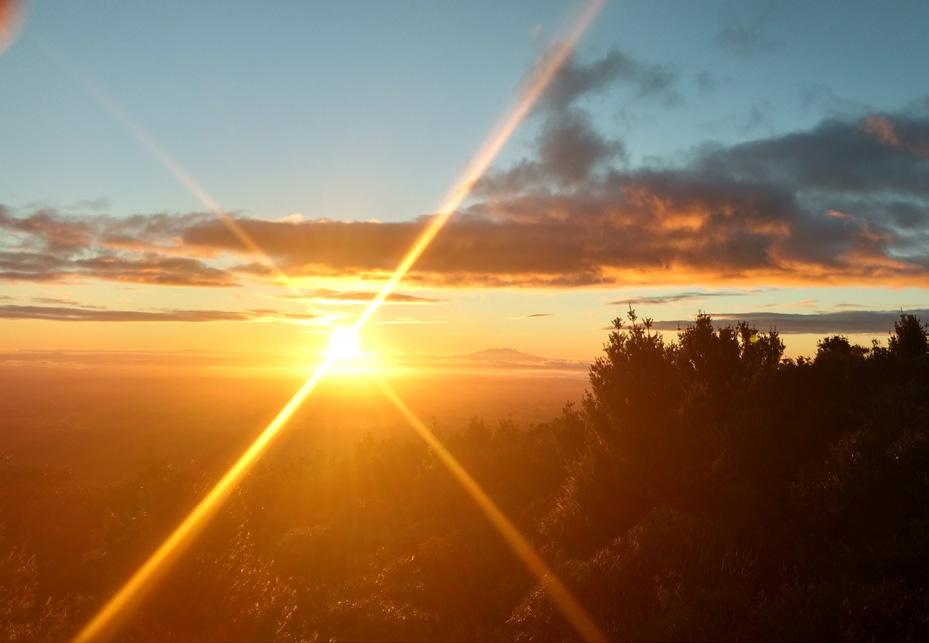
Do you have a photo you’re keen to have featured in SALT? Send it to us at saltmagazine@salvationarmy.org.nz .
WORD OF THE MONTH
Vaipuna
(Samoan, noun) Waterfall
saltmagazine.org.nz 5
INTERNATIONAL PRAYER
• Laos—There are around 200 ethnic subgroups in Laos. Please pray for unity for Christians and their leaders despite their ethnic differences.

• Benin—Voodoo is an official religion in this African country. Please pray for Christians as they face persecution from their communities and families, particularly in the north.
• Southern Mexico—Pray for the Church, particularly in Chiapas where Christians are persecuted by their families, communities and authorities. Pray that Bibles in indigenous languages will be made available.
• Azerbaijan—Please pray for the two percent of Christians in the 85 percent Shiite Muslim majority country. Pray for protection of believers as they face persecution and exclusion from society and families for their faith.
• Comoros—This country is small and one of the poorest nations in the world. It is 99 percent Muslim. Please pray for Christian workers and for Bible translations in the Comorian dialects.
SALVATION ARMY PRAYER
We continue to pray for the Kingdom of Tonga rebuilding after the eruption; Creative Ministries; Dannevirke Corps; the Data Analysis and Support team; Central, Midland, Northern and Southern Divisional Headquarters; Divisional Headquarters in Fiji; Digital Connect; Dunedin City Corps; The Salvation Army in Nigeria; and The Salvation Army in Norway, Iceland and the Færoes.
Prayer Focus: Somalia
An estimated 8.25 million people in Somalia—about half of the estimated population—need humanitarian and protection assistance according to the United Nations.
Prolonged drought, conflict, high food and water prices, displacement and disease outbreaks are the main drivers of the humanitarian crisis.
The impact is particularly severe for women and children who comprise more than 80 percent of the 3.8 million people estimated to be currently displaced.
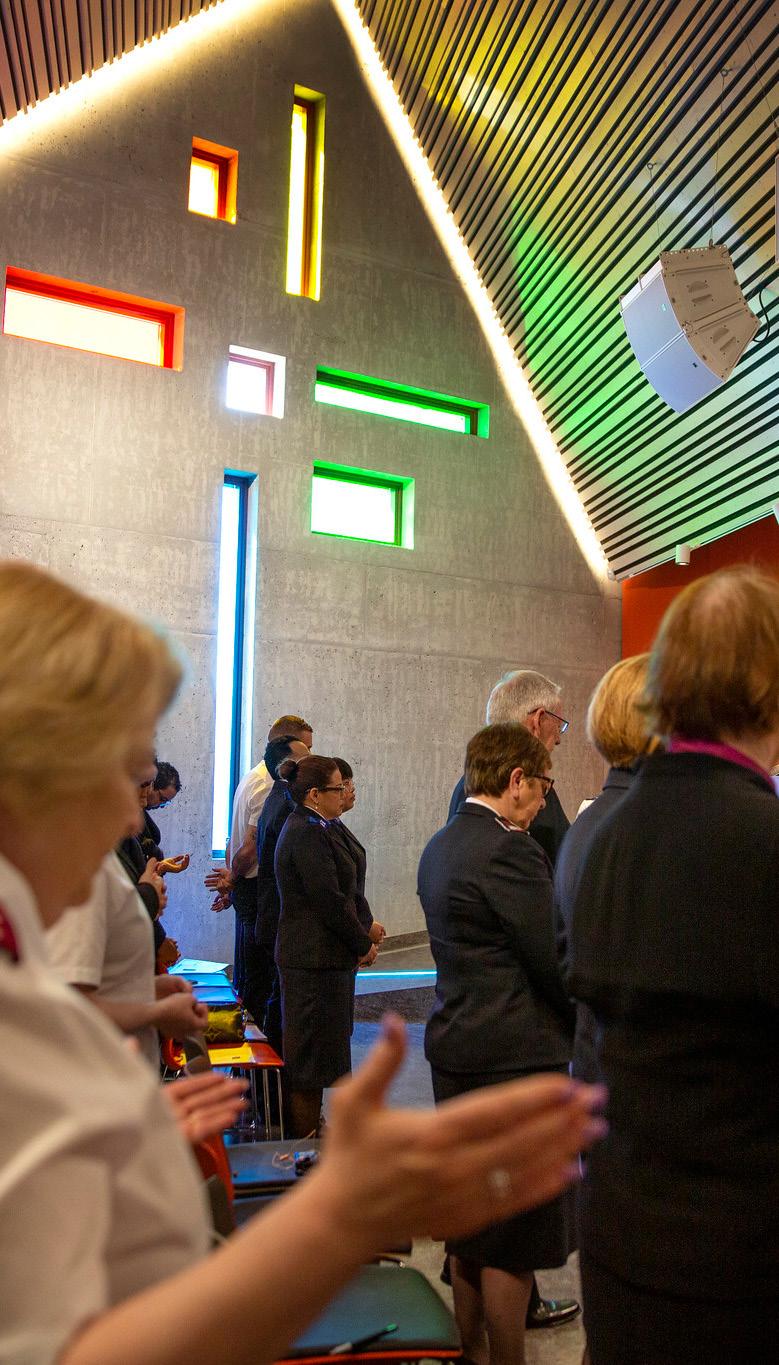
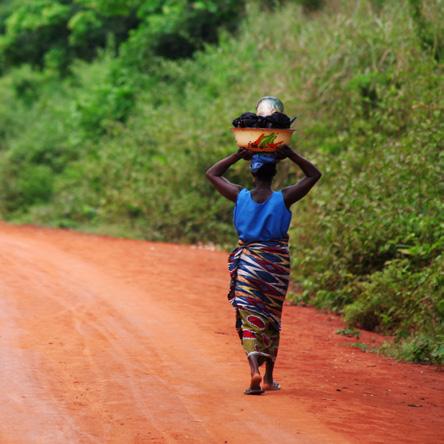

Following five consecutive low rainy seasons, Somalia’s current drought has surpassed other droughts in the 2010s both in duration and severity.
As fewer than a third of people in drought-affected areas have access to essential health care, reported cases of cholera and measles continue to surge. Meanwhile, more than three million children in Somalia are out of school, with existing classrooms often overcrowded. There is also a lack of trained teachers and resource materials.
6 August 2023
The Slow Work with Sandra McCracken

Religion and Spirituality | Christianity Today | Available on Apple Podcasts
This Christianity Today produced podcast is well worth a listen, particularly if you are a creative interested in the intersections and melding of faith and the arts. Sandra McCracken curates each interview with intelligent questions and thoughtful reflections to draw out the creative processes and thinking of people as diverse as bassist John Patitucci, to husband-and-wife artistic team Mako and Haejin Shim Fujimura (Mako’s latest book was previewed in our magazine earlier this year). The Slow Work achieves in each episode its claim of exploring ‘the pursuit of beauty, grace and justice in their lives and work’. (Reviewed by Vivienne Hill)
Do You Know This Person?
If you recognise the person in this photo, we’d love to hear from you. Email: archives@ salvationarmy. org.nz

Mission Impossible: Dead Reckoning Part One
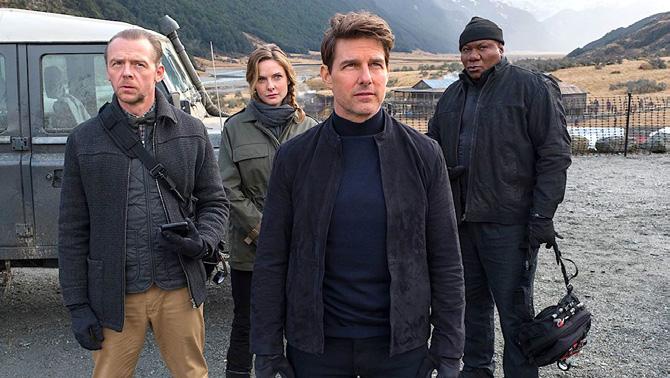
M, Action, Adventure, Thriller | Directed by Christopher McQuarrie | See in theatres
Some movies shine on the big screen and this high-quality action flick is one of them. As a series known for its overthe-top stunts (rather than deep plot lines), the seventh instalment is worthy of the Mission Impossible moniker. Lead actor Tom Cruise trained for three years, including 500 skydives and 13,000 bike jumps for just one of them. From the opening sequence to credits rolling, there is a regular pace of extended action sequences and beautiful settings. This is only broken by enough dialogue to keep it interesting and to let the audience catch its breath. Bring on part two! (Reviewed by Matt Gillon)
Finding Michael
PG, Documentary | Executive Producers Bear Grylls and Nimsdai Purja | Available on Disney+
This is an absorbing documentary detailing the attempted recovery of Michael Matthews, a climber who died on Mount Everest over 20 years ago. His younger brother coordinates a search based on a grainy photograph of a body that he believes may belong to Michael. The past and present are interwoven as we view original footage of Michael’s climb alongside that of the rescuers as they retrace his steps. The risks involved in climbing Everest are evident as many bodies are discovered along the way. Themes of grief and familial dedication intertwine as does a sense of shared humanity. (Reviewed by Fay Foster)

A home is a kingdom of its own in the midst of the world, a stronghold amid life’s storms and stresses, a refuge, even a sanctuary.
DIETRICH BONHOEFFER
saltmagazine.org.nz 7
Refuge in Rolleston
Lieutenants Grace and Stu Duxfield, leaders of the Rolleston Corps (Church) Plant since 2019, are people of hidden depths. Skimming the surface is not for them—treasure is found in the deep. The Rolleston crew are passionate about providing a safe harbour for those battling the waves to drop anchor and take refuge from the storm.
WORDS Jules Badger
n 1990, Rolleston (Roretana, Tauwharekākaho), a little rural farming community located 22km south of Christchurch, had a population of just under 1000 people. Today it is an urban boom town of 28,000 and climbing, with people coming from across the country and all over the world. Why? With a nimble district council rapidly approving building consents post-Canterbury earthquakes, a continually expanding industrial subdivision providing plenty of employment opportunities for residents, along with soaring national house prices and the current cost-of-living crisis—well, you can get more bang for your buck in Rolleston.
Coming home
An obvious place for The Salvation Army to be, in 2014 newly commissioned officers Lieutenants Naomi and Nathan Holt took up the challenge of planting a missional expression in fast-growing Rolleston. Three years into the planting journey, it was time for The Salvation Army Rolleston to find permanent digs. Salvation Army leadership supported the Holts to experiment with a centre that didn’t look like a traditional church. Not knowing entirely what that might mean at the time, a large house was purchased, now known as ‘Generation House’—a place where everyone is welcome.
‘The idea was for a space where you felt like you were coming home,’ explains Lieutenant Stu Duxfield. ‘Not a clinical space, but a familiar space where it just so happens you can access professional help.’
Growing pains
Before the earthquakes there was just one primary school in Rolleston, now there are eight. When Grace and Stu arrived in 2019, their son’s school had 250 students, now there are 700. There is currently one high school with 1900 students on its roll, but Stu reports that building is underway to extend the capacity to 2400 students. ‘There is a second campus due to open in 2025, with the combined capacity of both being 4500. It’s the fastest growing high school in the country, and on track to be the largest in New Zealand.
‘Rolleston as a community is really wrestling with what it means to have so many teenagers in town. In terms of the development plan for community spaces, Rolleston is about 15 years ahead of where they imagined the population to be,’ explains Stu. ‘There is no magic solution to answer the lack of infrastructure to support that exponential growth.’
Good things take time, but with such rapid growth, Rolleston is a town navigating constant growing pains while trying to form something of an identity. ‘The key challenge here is fostering a sense of community,’ says Grace. ‘There’s no history, so there’s no rhythm. Everyone is relatively new, so no one has long-standing relationships. We see across the board a pervasive sense of loneliness. When everything is unfamiliar and you’re feeling uncomfortable, it’s hard for people to reach out and take that step of meeting new people. And Rolleston is quite a chaotic place to live—there are building sites of one form or
8 August 2023
another everywhere. We help as much as we can to provide opportunities for people to connect with one another, so we can all be part of growing together as a community. It’s exciting, but it’s still a challenge.’

Weight bearing
When Grace and Stu were appointed to Rolleston in 2019, God gave them the words ‘sanctuary’ and ‘restoration’ to meditate on. Matthew 11:28–30 also drew their attention: ‘...come to me all who are weary and burdened, and you will find rest’ (abridged).
‘These key words have become the kaupapa (purpose) for Generation House and what defines The Salvation Army during this season,’ says Grace. ‘The idea is that no matter what we are doing or who we are interacting with, we want people to be certain they are safe. Come here and you are safe, full-stop. That’s our goal first and foremost,’ adds Stu. ‘You may be in the middle of a crisis, but you don’t have to be in crisis here—here you are safe. We can help bear the weight.’
While many residents made the initial move to Rolleston because of its affordable new housing, many have large mortgages and little disposable income. ‘Some people come to us for food because that is what The Salvation Army is known for, and that’s the easy part. We have a choice-model foodbank, so if you need food, it’s yours. But the greater need is often to find someone who’ll listen. Creating that space of sanctuary quickly became increasingly important for us.’
Both Grace and Stu have had experiences where people came to talk with them because they didn’t know where else to turn. ‘People have felt safe enough to reveal things about themselves that they haven’t told any other religious figure because they have
Above: Lieutenants Grace and Stu Duxfield outside the new Te Ara Ātea Library in the town centre.
saltmagazine.org.nz 9
‘Sometimes we try to do the work of restoration without first establishing this safe place of sanctuary.’
been afraid of a response of rejection,’ says Grace. ‘In several of those cases, people have physically hidden behind things while telling me, which is a very visible expression of extreme discomfort. But it’s such an honour and a privilege to hold that space for them to be their true and honest selves and assure them that there’s no change in how accepted they are because of what they have just shared. “You are just as accepted now as you were before you told me that.” There’s freedom and a sense of weight being lifted from people, which is powerful to be part of,’ says Grace.
Stu observes, ‘Sometimes we try to do the work of restoration without first establishing this safe place of sanctuary. How can you heal from something you are still in the middle of? People need to feel safe before they can move on to the harder part of the conversation. If we can’t nail the feeling safe part, then we are unlikely to get to restoration. We’ve spent quite a bit of time celebrating when people have felt safe enough to tell us they’re in an abusive relationship, for example. That’s a win for us.’
Next steps
Staff and volunteers at Rolleston attend trauma-informed workshops as part of their training. ‘If people come asking us for help, it’s probably the worst day ever for them, and they have already done a lot of hard work to get this far. Honouring that effort is so important,’ says Grace. ‘So we say, “breathe, pause”. And offer the gifts of time and agency and trust and respect—and, of course, coffee.’
Alongside the foodbank is the Hamodava Café. ‘Part of the idea behind the café was just giving people yet another reason to check us out. It might be scary going to the foodbank,’ explains Grace, ‘but not too scary to get a coffee and sort of test out the vibes.’

Generation House is an intentionally shared community space, where referrals between support groups like AA (Alcoholics Anonymous) and Perinatal Support Canterbury are reciprocal with the foodbank and chaplaincy. There is a small local group of adults with autism who meet in the space and independent counsellors are also on site most days. ‘We don’t have to own something for it to be good ministry, good for the community and good for God. This space is a gift, so we make the spaces available,’ explains Grace.
 From top: Grace in Hamodava Café; ‘The Shed’—a separate space especially for church. Right: Generation House—the community centre that looks like home.
From top: Grace in Hamodava Café; ‘The Shed’—a separate space especially for church. Right: Generation House—the community centre that looks like home.
10 August 2023
‘You may be in the middle of a crisis, but you don’t have to be in crisis here—here you are safe. We can help bear the weight.’
Sunday sanctuary

‘Different people connect with God in different ways,’ says Stu. With a desire to honour that fact, Grace and Stu wanted to try and curate a Sunday rhythm that maximised people’s ability to connect with God, rather than a one-dimensional expression of church. Taking into consideration different learning styles and spiritual pathways, as well as acknowledging people’s work schedules, sporting commitments, family priorities and the reality that not everyone comes to church every week, the team are experimenting with a monthly ‘rhythm of worship’.
The first week is Pancake Sunday with the emphasis on community connection and conversation. The second Sunday is Café Church and, following some input and guiding questions, group discussion is the order of the day. ‘God has a message that can be revealed through lots of people, not just the person up the front,’ explains Stu. Week three is Deep Dive and is more academic, like a theological lecture. ‘It’s the strangest thing because it breaks all the rules of what people tell you about how you should do church,’ says Stu. ‘It’s usually a 45-minute message from Grace, but it’s what people have asked for—just not every week!’ The month wraps up with Musical Worship and is exactly as it sounds—it may include a short message but worship and reflection are the focus. If there is a fifth Sunday in the month, everyone goes to kids’ church!
‘No church has ever started out thinking that we want people to be uncomfortable here—it’s just not true about any church. But sometimes church misses the mark for people, and so we come back and review why we do things,’ says Stu. ‘And even if we have closely and carefully examined why we are going to do something, if people tell us what they are experiencing isn’t meeting our stated purpose once it’s established, then we are going to change that,’ adds Grace.
Reels of joy
Grace and Stu recently added ‘joy’ to the Rolleston kaupapa. ‘We’re still all about sanctuary and restoration, but we also have a lot of fun! Joy is also something we are chasing,’ says Stu. Like everything they do, Grace and Stu are intentional about their online presence, and there’s plenty of joy evident in Rolleston’s online messaging. ‘We do a lot of fun reels on Instagram,’ explains Grace. ‘We recognise that social media is a space where we can reach a lot of people and just plant the idea that The Salvation Army is made up of real humans who have fun and can laugh with each other—a place where people can connect. It’s less scary to walk in the door and ask for help or come to church when people have seen our faces.’
saltmagazine.org.nz 11
Turn Down the Noise!
The first weekend of July saw 120 delegates from across the territory gather at Silverstream Retreat Centre in Upper Hutt for The Salvation Army’s annual children and youth leaders MORE conference. With the pandemic preventing a face-toface gathering last year and instead a series of sessions online making up the conference, being together again was a highlight for many. Jules Badger reports, photography by Kevin David .
‘People were so happy to be back in the same room,’ says Youth Missions Coordinator Annika McLeod. ‘Feedback we’ve received about this year’s conference reiterates how much people value the opportunity to get together annually. Covid-19 restrictions proved that we had taken that for granted in the past.’

With no more pandemic-related travel restrictions, delegates from Fiji, Tonga and Samoa also attended, with Annika reporting, ‘I cannot imagine MORE without our Pasifika
whānau (family) being there, it was so good to have them with us.’
On the Friday before MORE began, the Children’s Mission Department ran a full-day mini conference called ‘On Track’, specifically for children’s mission and ministry leaders.

Creating space
This year’s theme was ‘Our World Today’. Annika explains that the inspiration came from post-pandemic pondering about the nature of life in our world today. ‘Covid-19 has
changed so much for young people, and that got us thinking about everything that’s coming at them. They’ve lived through a pandemic, there’s war in Ukraine, climate change, natural disasters here in Aotearoa and the Pacific, and also new social media apps and the noise of influencers. As we were thinking about what our young people are facing—what our children are growing up in—we realised that our leaders are also facing those things but, on top of that, they’re trying to support the next generation effectively. Just thinking about that turned up the noise in our heads!’
The planning team were determined to create space for delegates to step away from the noise of the world and position themselves to hear from God. On the Sunday morning during the final session, Captain Emma Howan (Blenheim Corps) preached and allowed time to be in the moment with God. Children’s Mission Director Lt-Colonel Debbie Clark facilitated a response time for everyone present—
12 August 2023
delegates, musicians, event organisers and tech support—to be still before God. ‘That final session was a powerful moment in the conference,’ reports Annika.



Prophetic synergy
As usual, a great line up of speakers was featured, with returning favourite Margaret Spicer back for MORE. With decades of experience in children’s mission, Margaret is currently the director of Partner Services for the Irresistible Church Network. As a mother and now grandmother, Margaret knows firsthand the value of age-appropriate faith formation in children and youth. Margaret spoke on the Friday night from Luke 4, encouraging delegates to strengthen their nets and push the boat out one more time.
New to The Salvation Army scene, Wayne Poutoa spoke on Saturday night. A former Baptist pastor, Porirua City councillor and experienced youth advocate, Wayne is currently managing Youth Guarantee


Programmes from New Plymouth to Invercargill. Wayne didn’t hear Margaret speak, and had never met her, but he spoke from the same Bible passage, reiterating the same message. Annika confesses that as a delegate she has experienced speakers align spiritually before. ‘I always just assumed it was planned. But this time, as an event organiser, I knew this was the Holy Spirit—insane! God definitely wanted a specific message to get through.’
Territorial Youth Secretary Major Mat Badger agrees, saying, ‘The synergy between Margaret and Wayne’s messages was a prophetic word for our place and time. We do need to keep pushing our boats out and make sure our nets are strong because we are living in challenging times. But it’s not time to give up. We need to continue to step out in faith if we are to reach the next generation with the message of Christ.’
Winning streams
As well as great speakers, the weekend included a great line-up of workshops. ‘This year we split the workshops into two separate streams,’ explains Mat. ‘One for children’s leaders and the other for youth workers. The value in this was having people involved in the same ministry being able to network within their area of focus, as well as learn from one another. The streams were a real win for us.’
MORE also had plenty of fun on offer, with laser tag, a donut truck, board game space and marketplace after Saturday night’s session. The marketplace consisted of various interactive information stalls like Blue Mountain Adventure Centre, Booth College of Mission, Candidates Department, Manna Bookstore and, of course, the all-important TeeHQ for all your Salvation Army T-shirt needs!
Wayne Poutoa speaking on Saturday night.
Watch the MORE Conference 2023 highlights at youtube.com/watch?v=PT6sR4Hzr2o saltmagazine.org.nz 13
Margaret Spicer speaking on Friday night.
Enduring Joy
Are you a glass half empty or a glass half full person? A person who tends to see the positives, or a person who sees the negatives? There is nothing wrong with seeing the risks or blockages in situations and circumstances, but is this your natural response?
A friend once asked me a question regarding my ministry and leadership as an officer of The Salvation Army: Do you find joy in your life? I had to think and reflect upon that question for a moment before I responded. Now that’s not to say I don’t have my bad days, but overall and knowing a little about what he meant by ‘joy’, I said, ‘Yes, I do’.
‘Beyond Words’ is a series written by Ruth Haley Barton who talks about a space that can challenge our joyfulness:
Richard Rohr calls it ‘liminal space’—a particular spiritual position where human beings hate to be, but where the biblical God is always leading them. The Latin root ‘limen’ literally means ‘threshold’, referring to that needed transition when we are moving from one place or one state of being to another. Liminal space usually induces some sort of inner crisis: you have left the tried and true (or it has left you), and you have not yet been able to replace it with anything else.
We are in a season of change in The Salvation Army, not forgetting all that is happening within our communities. We as an Army are asking the questions about how we more effectively fulfill our mission of caring for people, transforming lives and reforming society by God’s power. How we live out the gospel of Jesus Christ and be the Army that brings life, individually and as a Christian movement in community. Change is always with us, a perpetual ‘liminal space’, and it doesn’t feel very joyful at times, particularly when it usually induces some sort of inner crisis. So, my prayer for you comes from our Bible reading in Romans 15:13. Joy is a fruit of the Spirit, which is a characteristic of the life of Jesus, and one we live out as his followers.
Commissioner Mark Campbell Territorial Commander
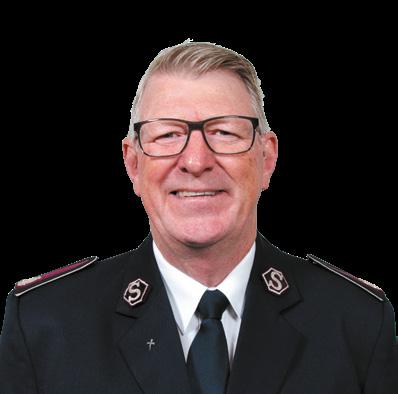
Romans 15:13
May the God of hope fill you with all joy and peace in believing, so that by the power of the Holy Spirit you may abound in hope. (RSV)
Nā, mā te Atua, nāna nei te tūmanako, e whakakī koutou ki te hari katoa, ki te rangimarie, i runga i te whakapono, kia hua ai tō koutou tūmanako, i runga i te kaha o te Wairua Tapu. (PT)
La me vakasinaiti kemudou mada na Kalou, o koya na vu ni nuinui, e na reki kecega kei na vakacegu ni dou sa vakabauta, me levu sara na nomudou i nuinui e na vuku ni nona kaukauwa na Yalo Tabu. (FOV)
Ham binti karta hei ki Parmeshwar, jon tumme aasha dewe hei, u tumhaar biswaas ke kaaran tumme aasheesh dei ki tumme puura saanti mile. Aur Pawitr Aatma ke taagat se tumhaar aasha puura hoy. (FRHNT)
Pea ko eni, ko e ‘Otua ‘oku ‘a ‘Ene ‘Afio ‘a e faka‘amanaki, ‘ofa ke ne fakafonu kimoutolu ‘aki ha fu‘u fiefia mo melino ‘i ho‘omou tui; koe‘uhi ke mou tupulekina ‘i he ‘amanaki lelei, ‘i he ngaue ‘a e Laumalie Ma‘oni‘oni. (TMB)
O le Atua foi e tupu mai ai le faamoemoe, ia faatutumuina outou e ia i le olioli uma atoa ma le filemu, ina ua faatuatua; ina ia tele lava lo outou faamoemoe ona o le mana o le Agaga Paia. (SOV)
14 August 2023

Art: Sam Coates
The Court of New Beginnings—Te Kōti o Timatanga Hou
The Salvation Army’s Chaplaincy Services works with a wide range of organisations and individuals. Carmel Claridge shares with us the ministry being undertaken at the Auckland District Court.
In the middle of Auckland’s busy CBD, a steady stream of people passes through the Auckland District Court from Monday through to Saturday. It can be a stressful and dehumanising environment for people facing charges, or those supporting whānau (family) who are in trouble with the police.
The Salvation Army provides a nonjudgmental and supportive space directly opposite Courtroom One. The office is shared by Salvation Army Chaplain Sharyn Olds and Te Kōti o Timatanga Hou (TKTH) Court Coordinator Carmel Claridge.
TKTH—also known as the Court of New Beginnings—is one of the specialist courts operating out of the Auckland District Court. It was set up in November 2010 in response to concerns about an increase in lowlevel, public nuisance offending by people experiencing homelessness in central Auckland.
TKTH uses a non-adversarial, inter-agency approach to address socio-economic, health and alcohol or drug dependency issues that may be driving an individual’s criminal offending. It offers support to individuals experiencing
homelessness who are repeatedly presenting to the criminal justice system, and who express the desire to make behavioural changes and follow a better life path.
‘It is a mistake to assume that all homeless people offend,’ Carmel explains, ‘but for the minority who do it is usually directly related to their life situation. The criminal justice system shouldn’t just be a revolving door between prison and the street. When people have literally nothing to their name, no resources, nowhere to go, no support—it’s pretty harsh to expect them not to break the law in order to survive. I believe TKTH is a much better response to a really big problem that traditional approaches haven’t been able to fix.’
How it works
The court sits monthly and works closely with up to 10 participants at a time. The TKTH team is comprised of Sharyn, Carmel, Judge Tony Fitzgerald and Whaea Michelle Kidd, as well as representatives from Corrections, Police, Auckland Community Law and keyworkers from social agencies. Unlike traditional courts, the TKTH process is inclusive of the participant’s voice, and they are encouraged to share their thoughts and concerns throughout the process. Care is taken by the team to ensure that participants are validated and encouraged—increasing participants’ sense of belonging, optimism and trust in the programme. TKTH endeavours to be culturally aware, responding to its predominantly Māori participants, as well as meeting the mandate of courts to uphold Te Tiriti o Waitangi.
Once someone has been assessed as suitable and formally entered into the TKTH programme, a court plan

16 August 2023
is drawn up, establishing goals that the participant hopes to achieve, and this is monitored each month at court. Although the primary aim is to house the homeless, every court plan is unique and tailored to an individual’s presenting issues. The plan might also include reparations to ensure that a participant takes responsibility for the consequences of their offending.
The court team provides pathways into housing, legal advice, medical and social support—helping people do practical things like enrolling in a course, getting an ID or a driver licence, sorting out a lease or reconnecting with whānau. When participants reach the goals in their court plan, which usually takes between 6 to 12 months, they graduate from the court. They are sentenced, usually by way of a conviction and discharge, and often receive a remittance on any fines owing. They also receive a graduation certificate and a pounamu.
Seeing results
Judge Fitzgerald has been with TKTH since 2012. He emphasises the value of working collaboratively as a multi-disciplinary team: ‘It is a great privilege to preside in Te Kōti o Timatanga Hou each month. I’ll never cease to be amazed and inspired by the progress that participants in the court programme make with the help and support they receive from the team and the agencies involved.
The success of the programme is in the strength of that team of special people to whom I am very grateful for the wonderful work they do.’
An evaluation of TKTH’s first 15 participants showed that arrest rates have been reduced by 66 percent during participation and sustained for six months following the court programme. Bed nights in prison for those taking part in TKTH have reduced by 60 percent following the court programme. There has also been a reduction in emergency department visits for participants—16 percent during participation, with a further 57 percent reduction in the six months following completion of the court programme.
They don’t judge straight away; they give you a chance.’
When we acknowledge the systemic issues outside of a person’s control and break down the practical barriers to full participation in society, we give people the chance to build better lives for themselves. TKTH is laying the foundation for that work to be done.
Transformative change is not easy. Yet, despite the huge challenges participants and their whānau face daily, many of them achieve things they had previously considered well beyond their capability. One person noted: ‘It’s the longest I’ve stayed out of jail in 30 years. It’s kept me out of trouble.’ Another said that ‘it’s just really motivating being surrounded by positive people who treat you well.
The work of Chaplaincy by The Salvation Army in New Zealand is varied and impacts many areas of society.

Please follow these links for two videos highlighting the services offered by Chaplaincy:
• Andrew McKerrow, Making a Difference—Salvation Army Racetrack Chaplaincy: youtu.be/y0-CFSL1M5M
• Major Joe Serevi, Our People Salvation Army Street Chaplaincy youtu.be/eGMC7S7j2CA
The criminal justice system shouldn’t just be a revolving door between prison and the street.
An evaluation of TKTH’s first 15 participants showed that arrest rates have been reduced by 66 percent during participation and sustained for six months following the court programme.
saltmagazine.org.nz 17
Left: Graduation of Thomas Reihanan with Judge Tony Fitzgerald and Whaea Michelle Kidd. Above: Carmel Claridge and Sharyn Olds.
Addicted to Jesus
Amelia Eagle from Levin Corps is now clean and sober and living her best life as a beloved child of God. Amelia wouldn’t be where she is today without the support of her church family, her sponsor and the love of her parents, husband and son.
I’m a 34-year-old mum of a little blond rocket called Rex, and I’m married to Shaan. Until a year ago, I had never stepped foot inside a church, read a Bible or even considered believing in God. If you had told me back then that one of my best friends would be a priest, I would have laughed my head off.
I grew up in a loving family, with parents who have been married for 36 years. I wanted to be a vet and that’s where I headed after college. However, a decision I made along the way sent me into a life of drug addiction.
On Christmas Eve 2018, I tried to take my own life. I was very close to succeeding, but by some miracle I was found and taken to hospital. I realised that if I didn’t change my life and give up drugs I would most likely die.
I tried to get clean and sober over the next few years with some successful stints. The longest being while pregnant with my son and the six months after he was born, leading up to mine and Shaan’s wedding day. Unfortunately, I relapsed again. This time round I had more to lose and a whole lot more to live for. I was so aware of my addiction and the grip it had on me, yet even with the will to give up I still found myself using and went around and around in circles wishing I could stay clean.
Shaan and I separated a year after our marriage, realising we couldn’t get clean while together. Family Court became involved, and we both risked losing custody of our son. Thankfully this was enough motivation for us both to look for professional help. We were offered places in rehab, but with Shaan going first and then me afterwards so we could do the programme separately.
When Shaan went to rehab, I realised I had nine weeks to wait, so I looked for support options. Soon
I had a great psychologist, a fantastic mental health support worker and an awesome counsellor. At this point, not once had I thought about God or church.
I went to the foodbank at The Salvation Army for a food parcel, where I met a lovely lady called Nicky. As well as making me a budgeting appointment and organising a food parcel, she offered to pray for me— something I had never done before. I had no idea what praying even involved, but something inside me said I should say yes, so I did.
Shortly afterwards I met Ben and Karen (corps officers). Karen gave me my first Bible—a Recovery Bible, which I treasure to this day. They invited me to come along to the Sunday service and I told them I would think about it. On Sunday I went along. I was stoked to be inside a church without being set on fire!
I’ve been to church every Sunday ever since. I’m addicted—but addicted to something good this time. I can’t explain how church makes me feel. It’s quite the emotional rollercoaster for me. I’m filled up with goodness every single week.
When it was my turn to go to rehab, I attended church every Sunday. People don’t realise just how much something as simple as a hug and a smile can be for someone who is in a dark place.
I wrote in my journal: I feel like I have people who believe in me. I know it’s ultimately me responsible for
People don’t realise just how much something as simple as a hug and a smile can be for someone who is in a dark place.
18 August 2023
changing my life, but this is the first time I’ve felt guided, like someone’s cheering me on daily with a 24/7 hug.
On 1 September I gave my heart to the Lord; and on 9 September I graduated and finished my stint at rehab, having learnt so much. Going to church and having so many friends there has been such a huge motivating factor for me to stay clean.
I was talking with my hairdresser about my journey, and he asked me if I was still going to church. Our conversation was overheard by a woman who just happened to be the reverend at a local church in Ōtaki. She invited me along to the Alcoholics Anonymous (AA) group there. I decided to go because I was trusting God more and there was no way this was a coincidence—meeting a priest, who runs an AA meeting while at the hairdresser! I got the message, Lord! I go to AA every week, and I’m working the Twelve-Step Programme. The priest is now my sponsor and a very good friend. I also attend NA (Narcotics Anonymous) meetings in Levin twice a week.
I was asked recently what my favourite thing about being sober is, and my answer was my mental stability

and the ability to emotionally regulate. When I’m anxious, I pray for calmness. When I’m angry, I pray for peace. When I’m triggered, I ask Jesus to take the wheel and remove these awful feelings, and it happens immediately—I can’t explain it.
Shaan and I have taken things slowly, co-parenting effectively with the help and support of both our mums. As of Christmas Day 2022, we are officially husband and wife again. With God’s help, we are rebuilding trust in each other. Our communication is amazing, and we have a whole new life of love and laughter.
Thank you, Lord, for never giving up on me! I feel so blessed to be a child of God, and a sober one at that.
I realised that if I didn’t change my life and give up drugs I would most likely die.
saltmagazine.org.nz 19
Above: Amelia with husband Shaan and their son Rex.
Te Kai Mākona Takes Off
Aroha (love), manaakitanga (holistic care of a person) and whanaungatanga (relationships) are just a few of the fundamental building blocks of Te Kai Mākona, The Salvation Army’s new food security and sovereignty framework. Launched in October 2022, following on from internal consultation and sector research as well as stakeholder and client feedback, Te Kai Mākona is starting to take off all over New Zealand.
WORDS Jules Badger
ife in beautiful New Zealand is not what it was pre-pandemic. The cost-of-living crisis continues to hit already struggling communities hardest, with a shocking one in six New Zealanders living with moderate to severe food insecurity. Unemployment may be at an all-time low, but rent is high in many communities and so are food prices. Where there is employment, hours are long, wages are often low and so is the hope of getting ahead. Food is often the first thing to cut back on when times are tough.
Te Kai Mākona represents a new chapter in The Salvation Army’s 140-year response to addressing food hardship in Aotearoa. It is a more mana-enhancing kaupapa (purpose) that seeks to build on the strengths and capacity people already have. Mākona means to be fully satisfied and have everything you need physically, emotionally, spiritually and socially. This powerful concept expresses our commitment to the pursuit of justice and equity for all New Zealanders experiencing food insecurity.
Demonstrable difference
Te Kai Mākona is an approach designed to support and strengthen those facing food insecurity through three key responses that align strongly with the
mission of The Salvation Army of caring for people by strengthening food provision, transforming lives by providing supports that build long-term food empowerment, and reforming society by addressing the underlying causes of food insecurity.
The first of these responses—strengthening food provision—is achieved by working relationally with individuals and whānau (families), using practice that responds to the specific requirements of the person or the family coming to us to meet their immediate food needs.
Lieutenant Andrew Wilson of Queenstown Corps says, ‘Te Kai Mākona strongly reflects our values as a Christian organisation. It’s a kaupapa of grace— all people are created in the image of God and have intrinsic value and dignity and are worthy of being heard. There should be a demonstrable difference between walking into The Salvation Army and walking into a government agency,’ he says. ‘In a community like ours with a lot of migrants who have come to New Zealand with low or no confidence, let alone trust in the likes of government agencies, removing eligibility criteria was a huge priority for us.’
Alexandra Corps Officer Captain Logan Bathurst agrees, explaining that, ‘For us and most of the
20 August 2023
other agencies in town it’s about getting food to the people who need it, but food is not the end game. The shift from eligibility to accessibility leaves room for building connection and exploring what’s underlying the request for food.’
Real relationships
The second response—food empowerment—is about supporting whānau to strengthen their own food security and sovereignty over time by offering a range of kai (food) supports which build longer-term resilience for households to meet their own food needs. These supports include offering choice model foodbanks (choosing kai), onsite pātaka (sharing kai), community and backyard gardens (growing kai), cooking classes (cooking kai), fruit and vege co-ops (buying kai) and collaboration with other services (partnering around kai).
Early adopters of Te Kai Mākona are finding choice model foodbanks to be a game-changer. Captain Suzanne Bathurst (of Alexandra Corps) says, ‘As an officer trying to live out our mission of caring for people, transforming lives and reforming society, the new choice model foodbank provides real opportunities

for connection. Recently I went into the foodbank with a woman, and while she shopped, we talked about her family and she asked me about mine—it was normal, real connection. People are now more likely to open up. If we were still packing parcels and handing them over, we’d miss out on that privilege of deep sharing.’
Alexandra volunteer Diane Barbara adds, ‘Because people can choose, that awkwardness is gone. You’re still providing a food parcel, but people are empowered to choose what they need, not what we think they should have. I love being part of something so positive.’
Above: St Peter’s School volunteers Ezekiel Mundy and Tommy Peters packing co-op produce at Cambridge Corps.
saltmagazine.org.nz 21
Together we are building hope by intentionally working towards food security and sovereignty for future generations.
Hutt City Community Ministries Manager Judith
O’Byrne describes the change in the experience of her volunteers. ‘Our team have gone from packing food parcels out the back for people they would never meet, to having conversations with those same people as they help them shop. Real relationships are forming— it’s good for everyone.’
‘I used to come up the stairs and people would be sitting around filling out their clipboards,’ explains Hutt City Centre Leader Major Ivan Bezzant. ‘The environment was transactional. But now there’s a real community vibe and the people are relaxed. I know that is down to the team and how hard they have worked to build that culture of care. It’s so different. From my perspective as a centre leader, all I did was say “yes let’s do this!” And then the team went to work. It’s beautiful.’
Alongside choice model foodbanks, many Salvation Army centres are also offering kai plans, a very useful
Te Kai Mākona tool. Kai plans provide assurance of access to food over a longer period, giving people the space and energy to resolve the more pressing issues that are contributing to their food insecurity.
‘Kai plans have been so well received here in Tairawhiti,’ explains Gisborne Community Ministries Team Leader Rayleen Wright. ‘Staff and volunteers appreciate being able to offer kai plans, as they are giving whānau breathing space to work out finances and create sustainability where possible. They provide a workable solution for whānau and encourage ownership.’
Kai plans and choice model foodbanks are just two examples of how Salvation Army centres are strengthening their food provision and building empowerment. Across the motu (land) teams are embracing the freedom of the one-size-does-not-fitall Te Kai Mākona approach and working with local partners to achieve amazing outcomes.
Inspiring innovation
Already a centre with a strong ‘cooking kai’ practice when Te Kai Mākona was launched, Rayleen and the Gisborne team stepped up to become a ‘response food hub’ during the Cyclone Gabrielle relief effort, with volunteers (including local chefs) cooking hot meals for evacuated families and emergency workers. ‘Cooking kai’ is now firmly embedded as a key food support in Gisborne. ‘We also cook and freeze meals using donated and rescued kai from our region,’ says Rayleen. ‘This enables us to provide meals in food parcels for whānau/individuals who need them.’
But it’s ‘hunting kai’ that is the latest innovation born out of the Te Kai Mākona kaupapa. Rayleen works to ensure meat is on the menu through a partnership with Kaiwhakangau—a group of local huntergatherers. With a kaupapa of ‘hunt to live, give and preserve’, Kaiwhakangau has been connecting local foodbanks on the East Coast with Ministry of Primary Industries-certified wild organic meat since 2020. The Village Butchery is also a crucial player in this unique collaboration, processing the meat into sausages and mince, for next to nothing.

22 August 2023
Below: The Village Butchery staff with Rayleen Wright and Mere Kara from Gisborne Community Ministries.
Palmerston North Community Ministries Manager Craig Fleury also wants to keep meat on the menu. Recently the team received four pallets of frozen 13kg boxed beef bones. ‘Partnering around kai’ with likeminded people in the community, including a local chef, Craig and his team arrived at a clever, collaborative, cost-effective solution for turning the bulk beef bones into smaller meal-sized vacuum-packed portions for whānau. Alongside the Gisborne team leveraging affordable quality meat provision through the ‘hunting kai’ partnership, the kind of inspiring innovation that Te Kai Mākona invites is clear.
Genuine generosity
‘It’s not just The Salvation Army helping people in our community,’ says Cambridge Centre Leader Lieutenant Ben Cola. ‘There are other amazing social agencies out there for us to be working with because we all want to see our community thrive.’
Cambridge is a small operation, but they have been able to offer a range of food security supports thanks to their strong local partnerships. Once a week,
students from St Peter’s School give up their lunch hour to weigh and pack produce to fill the fruit and vege co-op orders. Community Ministries Manager Julieanne Seath explains that co-op members simply go online and order what they want.

‘It’s tailored to their needs, and they pay for it, so their dignity is intact. One woman spent $40 on a box and then went home and got on the Countdown website to compare prices. She would have had to spend $80 there to get what she’d ordered. So we are totally behind this because it is so good for our people. It benefits everyone. And if there is ever anything left over, we can supply the foodbank and people can choose fresh fruit and veges.’
Top thinking
The third prong of Te Kai Mākona seeks to address the underlying causes of food insecurity through research, advocacy and the thought-leadership of our Social Policy and Parliamentary Unit, and by working with other organisations nationally.
On Wednesday 26 July, Te Kai Mākona’s external launch took place, with political advocates and top thinkers in attendance, including Deputy Prime Minister Carmel Sepuloni (see saltmagazine.org.nz/news).
There is excitement at the positive impact Te Kai Mākona is having, not only on whānau and communities across the motu, but also on The Salvation Army staff, volunteers and leaders. This new approach is revitalising joy in serving, as power shifts and connections deepen. Te Kai Mākona builds hope by intentionally working towards food security and sovereignty for future generations.
Te Kai Mākona represents a new chapter in The Salvation Army’s 140-year response to addressing food hardship in Aotearoa.
saltmagazine.org.nz 23
Above: Lieutenant Ruth Wilson (Queenstown Corps) setting up food displays in the community pantry.
A Shoe That Fits
WORDS Kelly Cooper | ART Nicole Gesmundo
As a teacher, I loved using theatre to engage my students. I would try on several different shoes to find my ‘perfect’ fit. My students would give me feedback about how each shoe looked, whether it was appropriate and if it fitted. I used this illustration to teach my students about making a great choice when choosing a book to read, but this can easily be applied to the choices we make in our lives too.

Some choices are easy to make, while others require a bit more thought, time and attention. My careful nature has always made the tension between God’s plan for my life and my own agency difficult to navigate: What if I make the wrong choice? What is the best choice to make?
I’m grateful that the Bible tells us that God knows in advance the plans he has for us and that they are good plans (Jeremiah 29:11). His plans are not to harm us, they are to take care of us. We can be certain that this promise is true. Sometimes our choices can lead us to unexpected and painful places. It can be really easy in these moments to wonder if we got it all wrong, but I think that God allows us to walk uncomfortably at times. It can feel like blisters and Band-Aids, painful and even purposeless, but we know that our God always has a plan. He can take everything, even our seemingly ‘wrong’ choices, and use them to create something incredible. In fact, it’s often where he does his best work.
Most of us know the discomfort of wearing shoes that are not made for us—aching and uncomfortable feet. Even if our current pair feel ill-fitting, we can always trust God has a plan and that he is good. And we can be certain that he will take every step with us.
24 August 2023

Order of Service
In a world where the demands on our time and energy are at an all-time high, it benefits us to ensure we have our priorities in order. Jules Badger challenges us to self-examination to ensure we can sustain our service.
Jesus said: ‘Come to me, all you who are weary and burdened, and I will give you rest. Take my yoke upon you and learn from me, for I am gentle and humble in heart, and you will find rest for your souls. For my yoke is easy and my burden is light’ (Matthew 11:28–30).
I vividly remember sitting in class at the Bible College of New Zealand (now Laidlaw College) as a 21-yearold, when the lecturer asked: ‘What is the purpose of our existence?’ At the time I was a new Christian attending the Faith Factory (Waitakere Central Corps) in West Auckland. I had just been enrolled as a soldier of The Salvation Army, having recently completed soldiership classes. The first thing that came to my mind was
The Salvation Army motto, ‘saved to serve’. I called out, ‘service!’ The lecturer pointed to me and said, ‘I’m so glad someone said service!’ I felt myself puff up—I was right! But my puff was quickly deflated as he explained that the modern church seemed intent on favouring service and mission over discipleship and spiritual formation—to its detriment. Essentially the lecturer was leading us into a discussion of the Westminster Catechism which says, ‘the chief end of (wo)man is to glorify God and enjoy him forever’. But what did that mean? As a young Salvationist I was conflicted because, if you’re anything like me, it’s mission and service that stir your soul and inspire you to go and do—to make
a difference in the world. For many of us, glorifying God is synonymous with service and mission—fighting the good fight, standing against injustice and making Jesus known through our actions. But therein lies the rub for us activists: enjoying God for who
26 August 2023
As The Salvation Army we have an incredible, others-focused, mission statement: Caring for people, transforming lives, and reforming society by God’s power.
God is—being with God—can easily get squeezed out. In class that day we were being challenged to consider the context and conditions for mission. It felt like a chicken and egg situation: which comes first, the Great Commission, loving others; or the Greatest Commandment, loving God?
Great, greater, greatest
As The Salvation Army, we have an incredible, others-focused mission statement: caring for people, transforming lives, and reforming society by God’s power. It’s bold and it’s beautiful. And yet, interestingly, the first of our He Waka Eke Noa values is ‘Put Jesus First’. So which is more important: mission in God’s name, or our relationship with Jesus? The Great Commission (love others) or the Greatest Commandment (love God)?
Grammatically we all understand that ‘greatest’ supersedes both ‘greater’ and ‘great’. All three are adjectives, but ‘greatest’ is the superlative adjective. Synonyms for greatest include supreme, unsurpassed, of the highest quality, the most excellent and matchless. And yet sometimes we put the Great Commission (go and make disciples) ahead of the Greatest Commandment (love the Lord your God), forgetting that the success of the Great Commission depends on the Greatest Commandment. If good is the enemy of great, great must also be the enemy of greatest.
I love that the first statement in The Salvation Army Officer’s Covenant
says, ‘I will love and serve God supremely all my days’. The order of service is clear—love God and then serve God. The first ‘I will’ statement of the Soldier’s Covenant says, ‘I will be responsive to the Holy Spirit’s work and obedient to his leading in my life, growing in grace through worship, prayer, service and the reading of the Bible’. Again, the order of service is very clear: love for God and waiting upon the leading of the Holy Spirit trumps service in God’s name every time—the latter flowing from the former. Our service and work for God must stem from our love and worship of God, not the other way around—not if our service is to have any substance or significance, let alone sustainability.
For or from God Counsellor, supervisor, author and sought-after speaker Richard Black (founder and director of Mind Health), explains that ‘the commandment to love the Lord your God with all your heart, soul, mind and strength comes first before loving your neighbour, not just because of the order of importance of the subject in each, but also because it is the order of necessity. In John 15, Jesus says that we are to remain in him and remain in his love, otherwise we cannot bear fruit. That is not to say that we are incapable of doing anything without God, but rather our actions must be an extension and expression of being in him for our actions to have any substance in his eyes.’
Richard Black expands further, alerting us to Jesus’ warning in Matthew 7:23. ‘Any actions and achievements coming from efforts that were not the result of remaining in him and his love—to those who had achieved much in his
name—Jesus said, “Truly, I never knew you”. Interestingly, according to Augustine, the Greek phrase can be used interchangeably with, “you never knew me”. The necessary reciprocity of our relationship with God reveals itself.’
Richard Black adds that in Galatians
5:6, Paul emphasises this point by conveying to us that the only thing that counts is faith expressing itself through love. ‘John also tells us that the love we show, we can only show because God (who is love, 1 John 4:8) first loved us (1 John 4:19). So, any action or service must be an expression of first being in God’s love and loving God back.’
This is a massive challenge to our capable, competent self-sufficiency in a world that values outcomes, pragmatism and achievement. It is not that the latter is not important, but rather that it must come as an expression from our being in Christ and our love for him and from him, to have any value in the eyes of the One who created us and whom we follow.
Are we working for him or from him? Our challenge as disciples is to remember that and live accordingly, keeping Jesus in his rightful place and service in its.
If good is the enemy of great, great must also be the enemy of greatest.
saltmagazine.org.nz 27
This is a massive challenge to our capable, competent self-sufficiency in a world that values outcomes, pragmatism and achievement.
A Look Inside the High Council
At the end of May, Salvation Army leaders from across the globe were summoned to Sunbury Court in London, to begin the serious task of electing the new general to lead the international Salvation Army. The general serves an elected term of five years, with General Brian Peddle having served since 2018.

It was announced on May 27 that Commissioner Lyndon Buckingham, previously the chief of the staff, had been elected as the 22nd General of The Salvation Army. Lyndon is the first New Zealander to hold this office. Aside from his most recent appointment as the chief of the staff, Lyndon has also been the territorial commander for Singapore, Malaysia and Myanmar Territory, and also for the United Kingdom and Ireland Territory.
The process for electing a new general is extensive and prayer-driven, and our Territorial Leaders Commissioners Mark and Julie Campbell had the privilege of being members of the council that discerned the Army’s next leader. ‘It was really humbling for us,’ Julie explains, ‘sitting in a room with 109 other leaders from all countries across The Salvation Army.’
The council met for just over a week to elect the new general, which included a farewell celebration for General Brian and Commissioner Rosalie Peddle.
Legal and spiritual imperatives
Mark and Julie explain that much of what occurred during each day of the process involved a lot of prayer and conversations between members. Each morning when the council met, prayers were read out from Salvation Army soldiers around the world, drawing the council back to the holy nature of their task.
‘Even though there was a process legally that we had to go through, we knew that we were there in the room to find the next leader who God was going to reveal to us, and who would be leading the Army in this next season. So, it was a spiritual exercise, even
though we were all working within the law,’ Mark explains. The week included a few formalities: electing the president, vice-president and chaplain for the High Council, confirming the Orders of Procedure for electing a new general, deciding on the questions to ask candidates and finally the election itself.
Although the overall shape of the High Council’s procedure was reported on while it was in session, there were some aspects of the process that were not open to the public, including the contents of the candidates’ speeches, which were made to the council members prior to the vote. When it came to making the decision around who they would support to be the new general, Mark and Julie had some idea of what they felt would be important for the Army.
A general for the times
‘For me, I talk a lot about leadership, character and competency, I’m always looking for that. All the candidates are godly people, but we need someone who
Above: Commissioner Lyndon Buckingham, previously the chief of the staff, elected as the 22nd General of The Salvation Army, and Commissioner Bronwyn Buckingham.
28 August 2023
Each morning when the council met, prayers were read out from Salvation Army soldiers around the world, drawing the council back to the holy nature of their task.
can step up, who has capacity and who has the heart to move into this role,’ Mark says.
Julie explains that she felt that the Army needed someone to hold steady, and yet motivate us in uncertain times. ‘We live in a really complex world. Life isn’t simple; it’s not black and white. I was looking for wisdom, for discernment. I wanted to see someone who was passionate and deeply in love with God, and absolutely committed to the mission and ministry of the Army. We need someone who would inspire and encourage us; someone who believed that as an Army, God wasn’t finished with us yet.’
Julie also wanted to acknowledge how significant it felt for her to have a woman officer as a candidate this year. ‘Colonel Diana McDonald had only been a territorial leader for a few months at the time, but I was really thankful to God that a woman was nominated—a married woman leader from Pakistan! Colonel McDonald spoke with assurance and had such spiritual authority and humility; she spoke about what she saw the Army needed going forward. I thank God that women’s voices were heard in this time, and that women leaders in The Salvation Army were seen and valued.’
Te reo Māori welcome
The election of Commissioner Lyndon Buckingham as the new general is particularly significant for our territory. Mark and Julie note that there was something special for them in welcoming
a Kiwi to the role of general, and that they had the opportunity to honour the Buckinghams' heritage at the High Council. ‘We were with Commissioners Robert and Janine Donaldson (general’s representatives for Mission Effectiveness) and Lieutenant-Colonel Jennifer Groves (private secretary of the chief of the staff) and were wondering what our response should be if Lyndon was elected. Robert went away and prepared a waiata (song), a karakia (prayer) and some Scripture to share in te reo Māori. So, when Lyndon was announced as the general-elect,
he and Commissioner Bronwyn stood together, and we blessed them with waiata and karakia.’
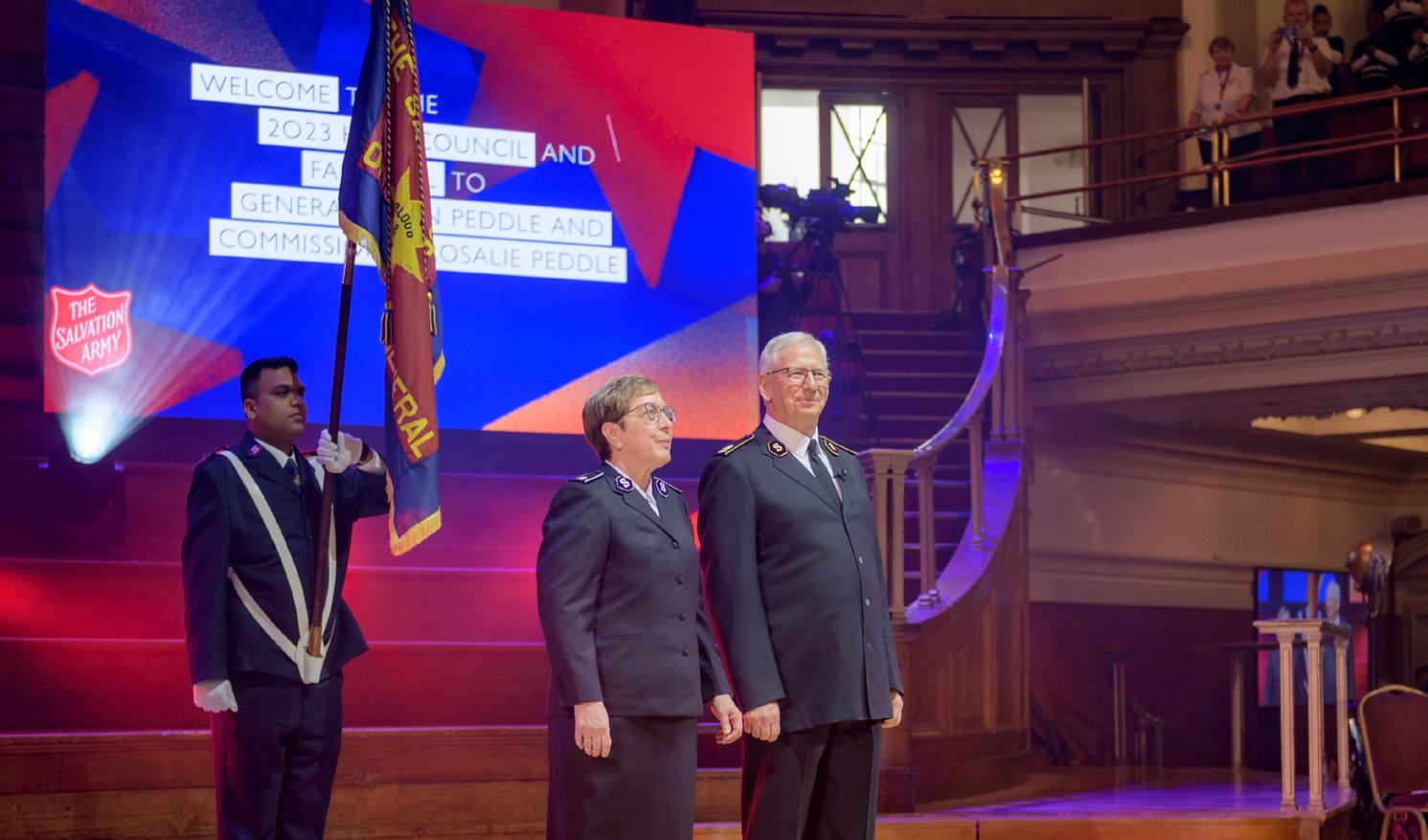
We are excited to announce that the General-elect Commissioner Lyndon Buckingham, along with Commissioner Bronwyn Buckingham, will be in attendance at this year’s Ordination and Commissioning service in New Zealand, as well as the 50th Anniversary Celebrations in Fiji.

Julie also wanted to acknowledge how significant it felt for her to have a woman officer as a candidate this year.
Above: Welcome to the 2023 High Council and Farewell to the General and Commissioner Rosalie Peddle; members of the congregation and 2023 High Council.
saltmagazine.org.nz 29
Tīmaru Corps Celebrates 140 Years

More than 100 people attended a Sunday meeting at Tīmaru Corps (church) during celebrations to mark 140 years of The Salvation Army in the South Island town. The anniversary theme was ‘Forward Focus’, honouring the foundation work over the past and looking forward to the next 140 years, says Tīmaru Corps Envoy Lynda Bright. Anniversary events kicked off on Friday evening with registration and ‘Café Catchup’, an opportunity to talk with other anniversary participants over a hot drink and look at historical photos. Saturday’s activities included a self-drive adventure in Tīmaru and surrounds— (with a map featuring sites of interest), a celebration service and family dinner. A Sunday meeting ended with morning tea and cake cutting with Mrs Yvonne Blaikie—oldest soldier on the roll and Kassi White— representing the young people of the corps (pictured).
For the full story, go to saltmagazine.org.nz
Hunt for Old Instruments
The hunt is on in band rooms, closets and attics across New Zealand for pre-loved musical instruments to be shared with Salvationists in Fiji Division as they prepare to celebrate their 50th anniversary. Territorial Director of Creative Ministries Jim Downey says the hunt is focused on second-hand brass instruments and timbrels. ‘People may have an old instrument at home or in their band room that is not being used at the moment but could go on to have a second life with The Salvation Army in Fiji,’ says Jim. ‘We are open to receiving all kinds of brass instruments and timbrels, whether they are surplus to the Salvation Army or have been in private hands.’
Contact Jim on email: jim.downey@salvationarmy.org.nz or phone 04 802 6269 Ext 24580
Salvation Army Supports Fairer Tax Campaign
Around 50 people attended the launch in Wellington of the ‘Better Taxes for a Better Future’ campaign, which calls for bold action to make New Zealand’s tax system fairer. The campaign is run by the Fair Tax Coalition, comprised of environmental organisations, campaign groups, unions, social service organisations, human rights groups and faith-based movements including The Salvation Army. The campaign calls on politicians to address inequities in our tax system and to ensure the system gathers enough revenue to enable the country to address the complex challenges it faces. Among the speakers who kicked off the campaign was Damien Hazlewood, a financial mentor based at Porirua Community Ministries. Damien has worked for The Salvation Army on the frontline of social need for the past 13 years, and is very familiar with the human face of poverty which the cost-of-living crisis is making worse.
For more information, visit bettertaxes.nz
30 August 2023
Modern Slavery and Human Trafficking Focus of Zonal Conference
Salvationists from across the South Pacific and East Asia Zone, including New Zealand and Tonga, gathered in Thailand recently to discuss the latest developments in the international response to modern slavery and human trafficking. Around 25 national contact people took part in the ‘Joining Hands for Transformation’ community of practice conference, held in Chiang Mai, Thailand, over five days in June. Representing our territory were Captain Sammy Millar and Major Asena Sifa. Sammy is the Territorial Modern Slavery and Human Trafficking response contact person, while Asena is based at Tonga Regional Headquarters holding the positions of regional director of Women’s Ministries, regional secretary for Personnel and Sponsorship secretary.
For the full story, go to saltmagazine.org.nz
Psychological First Aid Course Begins

The first official Salvation Army Psychological First Aid course for the territory, as part of a wider rollout, was delivered in Wellington recently. The one-day course equips Salvation Army emergency workers with the practical framework needed to support distressed people who have been recently exposed to a crisis event. Recent crises that have involved Salvation Army workers in providing psycho-social support include the Loafers Lodge fire in Wellington and Cyclone Gabrielle. Thirteen participants from around New Zealand, including Auckland, Feilding, Wellington and Christchurch, took part in the course, led by facilitators Captain Shaun Baker, Central Division Emergency Services coordinator and Cairine Barton from Territorial Community Ministries.
For the full story, go to saltmagazine.org.nz
Opening of Hāwera Family Store

Hundreds of people turned out for the opening of the new Salvation Army Hāwera Family Store, the fourth store in the Taranaki area. The building opened with a local kaumatua blessing the site, while Captain Karl Foreman from New Plymouth Corps did the karakia and a reflection. Salvation Army staff, volunteers and members of the local community attended. Other opening activities included a performance by the Youth Brass Band and the fun presence of Shieldy, The Salvation Army mascot. ‘It was awesome to see the strong support of the local community,’ says Taranaki Area Family Store Manager Josh Bollen.

For the full story, go to saltmagazine.org.nz
Read the latest news online at saltmagazine.org.nz
Looking for more news?
saltmagazine.org.nz 31
Official Engagements
Commissioners Mark (Territorial Commander) and Julie Campbell (Territorial President of Women’s Ministries)
10–14 August: Territorial Leaders’ visit to Westport and Greymouth

21–23 August: Officers Brengle, Booth College of Mission (BCM)
25 August: NZFTS and Australia Territorial meeting, Sydney
29 August–1 September: Combined National (NZ) Officers’ Hui
Colonel Gerry Walker (Chief Secretary)
16–18 August: Strategic Awareness visit, Central Division
25 August: NZFTS and Australia Territorial meeting, Sydney
29 August–1 September: Combined National (NZ) Officers’ Hui
Lt-Colonel Liz Gainsford (Territorial Secretary for Spiritual Life Development)
21–25 August: Officers Brengle, BCM
29 August–1 September: Combined National (NZ) Officers’ Hui
Gazette Summary
To read the full version of Gazette notices, visit saltmagazine.org.nz/gazette
Promotion to Glory: Major Joyce Langdon was promoted to Glory on Monday 19 June 2023, aged 80 years. Joyce entered The Salvation Army Training College in 1969 from Waihi Corps as a cadet in the Undaunted session. Please uphold Joyce’s siblings: Mary, June, Margaret, Barry, Pamela and Roy (deceased), along with extended family in your prayers in this time of grief and loss.
Bereavement : The father of Cadet Tania Viljoen passed away in Pretoria, South Africa, on 6 July 2023. We ask you to uphold cadet Tania Viljoen and her extended family in your prayers during this time of grief, loss and separation.
International Appointments and Promotions: Effective 1 September 2023, Lt-Colonel Michelle Collins, currently serving as Territorial Secretary for Communications, is appointed as Director: SASIA SALT Learning Centre–South Asia Zone, International Headquarters (based in Sri Lanka).
Effective 1 September 2023, Lt-Colonel Milton Collins , currently serving as Territorial International Development and Support Secretary, is appointed as Development Secretary, and Sponsorship Secretary (additional appointment), Territorial Headquarters, Sri Lanka Territory.

Effective 1 September 2023, Majors Garth and Suzanne Stevenson, currently serving respectively as principal/training principal and assistant principal/assistant training principal, Booth College of Mission are appointed as chief secretary and territorial secretary for Women’s Ministries, Papua New Guinea and Solomon Islands Territory. They will take up their new appointment responsibilities with the rank of Lt-Colonel.
Appointments: Effective 16 August 2023, following the appointments of Majors Garth and Suzanne Stevenson to international service, and until IHQ-approved successors are in place, the Territorial Commander is pleased to announce the following pro tem appointments (in retirement): Major David Noakes, principal/training principal (pro tem) Major Vyvyenne Noakes, assistant principal (pro tem).
We are pleased to announce the appointment of the following officers from the New Zealand, Fiji, Tonga and Samoa Territory to the International College for Officers:

Captain Faye Molen Session 260 15 January to 24 February 2025
Captain Shiv Ram Session 261 16 April to 26 May 2025
Major Vakatoto Wawa Session 262 16 July to 25 August 2025

Captain Shane Healey Session 262 16 July to 25 August 2025
Conclusion of Envoy Service: Effective 31 July 2023, the Territorial Commander announces the early conclusion of Envoy service of Envoy Wi Pirihi. We thank Envoy Wi Pirihi for his Envoy service and pray God’s blessing on him as takes on the sole care of his newborn mokopuna.
Save the Date
Kilbirnie Corps 110th Anniversary
3–5 November 2023
For more information, please contact: Major Silone Collins p: 027 478 4452 | e: kilbirnie.corps@salvationarmy.org.nz
50 years of The Salvation Army in Fiji 1973–2023
MARCHING ON: 50 Years Strong Founded on Faith; Inspired by Hope; Serving with Love
For more information and to confirm your attendance, please contact: Major Iliesa Cola or Captain Beth Campkin
fiji.dhq@salvationarmy.org.fj
Quiz
1.
2.
3.
5.
Answers:
Sudan,
Georgia,
Teacher, 4. Sachin Tendulkar, a mammoth 15,921 runs,
Peregrine Falcon.
32 August 2023
SALVATIONISTS IN HISTORY
Gisborne Flood: 1948
In Major Joan Hutson’s book titled As for me and my House: A Salute to Early Gisborne Salvation Army Families 1886 to 1952, published by Flag Publications in 2004, she shares an account of a flood affecting Hawke’s Bay that was recorded in the Gisborne Corps History Book. Below is an abridged version of events.
May [1948]: Gisborne’s most disastrous flood occurred. Major Elliot [then Gisborne Corps officer] was appointed Chairman of the Flood Relief Committee.
The town itself of 18,000 people sat squarely on a network of rivers and creeks. Each one overflowed its banks, threatening nearby houses.
Friday was a day of rescues, many difficult and dangerous as the waters continued to rise and people, especially country people, were forced to evacuate their homes. All day the community, including council workers, the police, sea scouts and ex-naval men, worked desperately to save lives. A series of slips had now closed off the main railway line south through to Wairoa, and the Waioeka Gorge was impassable. The airport and its approaches were underwater. Gisborne was completely isolated.
A gum-booted and oil-skinned figure with an Army cap was visible everywhere. In his fifteen or so months in Gisborne, Major Ernest Elliot had become a familiar figure to the town’s civic authorities and businesspeople. He conferred with the mayor, offering the Army’s facilities and was asked to form a relief committee. Its headquarters would be at The Salvation Army Citadel in the middle of Gisborne’s main shopping area.
Major Elliot, with the help of his Corps Sergeant Major and bandmaster, divided the bandsmen and male soldiers into rescue teams. His wife, Anne, and her home league secretary and their helpers set about making the two halls ready to receive the wet and
miserable evacuees. Many of these had left their flooded homes without food and without dry bedding or a change of clothes.
Almost before the first evacuees arrived, The Salvation Army halls were filling up with incoming goods, including food, clothing, mattresses and blankets. Receiving them was an army of willing helpers as well as the already alerted Salvationists. Welfare was The Salvation Army’s primary responsibility. Clothes had to be sorted, amongst them much needed blankets, jerseys and gloves, scarves and woolly hats. The goods that poured in threatened to smother the workers and carton after carton of clothing was stacked until they reached the ceiling.
Sunday proved to be another miserable wet day with winds gusting. The tidal rivers, especially at high tides, still threatened the bridges and the riverside properties. The whole corps was in rescue mode. And still it rained. What to do about the Sunday meetings? They stopped for half an hour. The bandsmen came in from their rescue work, the home leaguers paused in their sorting of clothes, everything was pushed back, and the proverbial Army cuppa tea was served. With great aplomb, Major Elliot led a rousing meeting.
Bandsmen, young and old, returned to the stricken areas and worked all day shovelling mud and distributing such necessities as were available. And still it rained.
By Monday morning, the rescue workers were desperate for dry clothing. Wading waist deep in water rescuing families and animals had also put paid to their footwear. It was obvious that more help was needed. A phone call from Major Elliot to Prime Minister Peter Fraser saw a consignment of 1000 suits of battledress, 1000 pairs of boots and underwear in proportion were despatched to Gisborne.
Slowly the rain eased off. The flood had inundated 21,000 acres of the 39,000 acres of flat land between Kaitaratahi and the sea. Two hundred cattle and 16,000 sheep had died.
saltmagazine.org.nz 33
Bandsmen, young and old, returned to the stricken areas and worked all day shovelling mud…
Attachment Theory 101
Attachment theory in parenting is concerned with how infants develop a close relationship with at least one caregiver in their lives, especially mothers, but also with other consistent caregivers such as the child’s father and grandparents.


This theory is used to describe the set of behaviours from the child towards the parent. Babies form an attachment with us (not us with them), and how we respond determines the nature of that attachment.
Attachment theory suggests that children are born into the world with two main needs: the need for closeness, comfort, safety, security and protection; and the need for exploration, independence and autonomy.
Children thrive when their parents are sensitive to the nuances the child is expressing and also responsive, offering support that fits that need. Children need their parents to be available and attuned to them both physically and emotionally.
Babies are wired to form this attachment with their parent: babies cry, and this moves their parent to feed them, soothe them or change their nappies; they babble and coo, and parents speak to their baby. When these things consistently happen, babies become confident that their parent can and will respond. In this way, attachment is important for the child’s social and emotional development, as well as their safety.
When children are exploring their world and asserting their independence, they need their parents to allow them the freedom to do that safely. Sometimes children become tired, scared, hurt or overwhelmed in the course of their exploration and they will return to their parent for closeness and comfort. Parents can help soothe their child’s emotions, providing rest and reassurance until the child feels ready to take on the world again.
For the full article from Parenting Place, go to tinyurl.com/SALTSafeSecure
Read: Whenever you feel afraid or unsafe, read Psalm 121 in the Bible or get an adult to read it to you. It will reassure you that God is awake all the time. He does not sleep at night like we need to. He can see in the dark as if it was day.
Think: How wonderful that God is available to talk to you all the time. He sent his Holy Spirit to live in you so that you are never alone. Think about all the people in your life who care for you and look after you.
Pray: Thank God for all the many blessings in your life: food to eat, a house to live in, learning opportunities in school, parents or caregivers to look after you and friends.
Do: After you have coloured in the image around our Bible verses from Psalm 121, why don’t you ask if you can put this up on your wall above your bed as a reminder that even as you sleep, God watches over you?
You can download an A4 version of the Psalm opposite at: saltmagazine.org.nz/resources

‘The LORD will keep you from all harm— he will watch over your life; the LORD will watch over your coming and going both now and forevermore.’ Psalm 121:7-8
34 August 2023
I lif t up my eyes to the mount ains— where does my help come from?
My help comes from the LORD, the Maker of heaven and ear th.
He will not let your foot slip he who watches over you will not slumber ; indeed, he who watches over Israel will neither slumber nor sleep.
The LORD watches over you the LORD is your shade at your right hand; the sun will not harm you by day, nor the moon by night .
The LORD will keep you from all harm he will watch over your life; the LORD will watch over your coming and going both now and forevermore.
Psalm 121
You are my hiding place; you will protect me from trouble and surround me with songs of deliverance.
Psalm 32:7



























 From top: Grace in Hamodava Café; ‘The Shed’—a separate space especially for church. Right: Generation House—the community centre that looks like home.
From top: Grace in Hamodava Café; ‘The Shed’—a separate space especially for church. Right: Generation House—the community centre that looks like home.














































